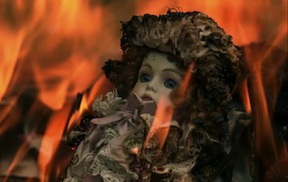At the Cork Assizes on Wednesday, Robert Sullivan was placed at the bar, charged with the wilful murder of his own child, by taking him up in his hands and placing him on a large turf fire, and so burning him as to cause his death. Mr Bennett stated the case, observing that it was one of the most lamentable and cruel he ever brought before a jury. The prisoner was charged with the wilful murder of his own child, a very young boy, by deliberately burning him on a fire. The fact was clear, and the only question the jury would have to decide was, if the prisoner was sufficiently in his senses at the time he committed the deed. He should mention that the prisoner was caught in the act of escaping to America. John Radcliffe examined by Mr Bennett – knows the prisoner at the bar; knew the deceased also; was living in the house with the prisoner; recollects him putting the child on the fire at the hour of 12 o’clock at night; the prisoner had been in Bandon and when he came home he told the witness to get up and untackle the horse; the deceased child was in bed at the time; the prisoner’s eldest child was in Bandon with him; witness having untackled the horse as directed, the prisoner told him to bring up the child to him; he did so, and the prisoner gave them both some bread; witness then put the child into bed with the prisoner; there was some hogwood lighting on the hearth; the prisoner was talking to the child and said ‘are you my Johney?’ the child made no reply; the prisoner said again, ‘in the name of the Father are you my Johnny? The witness was in bed about an hour when he was called up by the prisoner to bring some lighted hogwood which he did; the prisoner first took the child and put it down into an earthen pot of water; it was the child’s head was put into the pot; witness took the child from him and began to dry his head; the prisoner then took a bill-hook in his hand from the top of the bed, and, taking the child in his hand, he went to the fire; the prisoner said ‘You are not my child at all, you are a sheffraun;’ the prisoner put the child on the bog-wood fire, when it began to cry; witness then ran and called the boy who had been in bed with him (witness); the prisoner said ‘Why are you calling?’ to which witness replied ‘I am not calling’, as he was afraid; went out of the house, and called the boy through the window of the room; the child all this time was screeching and the father used to say ‘I’ll roast you and toast you in the name of the Father’ (sensation); the child died in about 24 hours after; was afraid of the prisoner at the time; went to call the neighbours, and, by the time he came back , the child was off the fire; the prisoner went to bed after burning the child; the prisoner’s wife died about a year previously; before the prisoner went to bed he told them to get some oil and rub it on the child; on the following morning the prisoner got up and went off with himself; he did not tell any person where he was going; the prisoner did not return that day; saw the prisoner after in the Bandon Bridewell; the witness was a servant to the prisoner who was a farmer; never observed anything odd about the prisoner up to the time he burnt the child. To the Court: The prisoner used to be often tipsy. To Mr Bennett: I did not get a doctor for the child as the prisoner’s brother and family were there, and they did not get a doctor; the child was very much burned. To Mr O’Hea. The prisoner had six children; the child that was burnt was a very fine little boy; ‘little Johnny’ seemed to be a pet with the father; heard the prisoner often talking to himself when out in the fields. Catherine Leary examined by the Recorder recollected the night the child was burnt; was in the prisoner’s house that night, and when a bystander said to him ‘you would not have burnt the child, if you had the Lord to guide you’. Sullivan replied ‘it was in the name of the Lord I did it, because I thought he was a sheffraun’; Sullivan did not appear drunk at the time. Dr Samuel Wood was examined by Mr G. Leahy, and deposed to having made a post mortem examination of the body of the child. There were most extensive burns all over the child, and quite sufficient to cause its death. Constable Wright swore that he arrested the prisoner in Liverpool on the 6th of last December, at which time he was on board a packet bound for America. Mr O’Hea addressed the jury for the prisoner, observing that the only defence he would set up was that of insanity. He called for an acquittal on the groun that when the prisoner perpetrated the acts his conscience was astray, and the feelings of his nature altered. There was no evidence adduced to prove the prisoner insane. His Lordship, in addressing the jury, observed that it was not the absence of the reasoning powers that constituted insanity, but the fact of an individual labouring under a delusion. A person under the influence of a delusion would commit a wrong act, totally unconsciously of it being so, but this same person might afterwards be perfectly conscious of the wrong he did, the delusion under which he acted, not then continuing. The jury without leaving the bar, acquitted the prisoner on the grounds of insanity.’ Anon, ‘A Child Murdered by its Father’ (1848)


